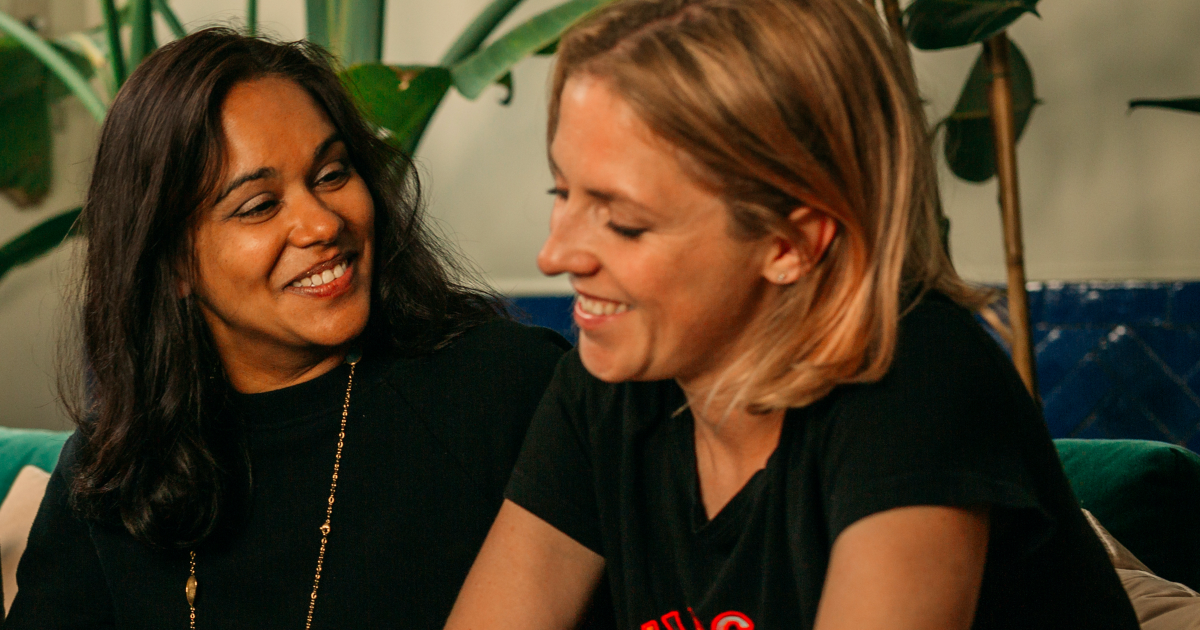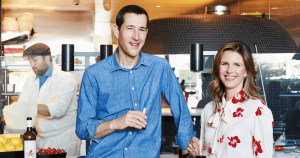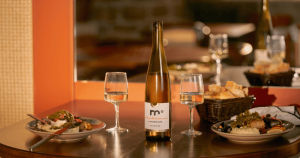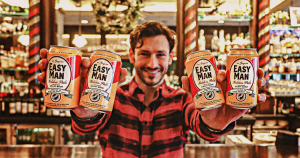As pioneers of the non-alc wave since their UK launch in 2018 and US expansion three years later, Three Spirit‘s co-founders Meeta and Tati navigate the intricate balance of scaling their functional products without compromising on quality. In this interview, they dive into the art of blending flavor with function and forecast the evolving landscape of social drinking. Highlighting the integral role of bar culture in building community, they share insights on how non-alcoholic options are maintaining and reshaping social connection.
Three Spirit was early to the non-alc wave. What have you seen in the past few years that’s been surprising to you, and how have you both helped to steward a brand through a rapidly changing space?
Tati: It’s really interesting to be a brand from the UK that’s functional. I’m proud of the UK, and you’ve got to give it to Ben Branson. Non-alc really did begin here and you can’t deny the influence he’s had on consumers and the industry. That’s really why we started. It’s amazing to have something that’s ahead of the US when it comes to a wellness trend, fundamentally.
What’s amazing for us is that I’m here in the UK, Meeta’s there in the US, and it’s such a significantly different market from my point of view. Because of what’s happening in function in the US. The way that the consumer is so receptive. They understand function, and that’s reflected in what’s happening in retail in the US versus the UK.
Plus, the broader consumer understanding of what we do at Three Spirit is really different. It’s wonderful that we’ve been able to do both markets quite quickly. The US is a wonderful place to be because of the acceleration of both functional and non-alc.
Meeta: When you see the rise of non-alc retail shops like Spirited Away and Boisson, you realize that you’re tapping into a consumer need that’s not being met from traditional retail or liquor stores.
It’s been like jaw dropping to watch the growth—and the speed of the growth—of these types of retailers in every city in the United States. It’s not just a coastal trend, a wellness trend. There’s people all over the US who are looking to moderate, looking for options.
It’s been a little surprising and frustrating, sometimes, to see how traditional retail has not adopted this as quickly as I think people would have hoped—brands or even consumers. When they do, it’s often a piecemeal strategy. But, merchandising, education, getting people to try is so critical at building a category like this. To just do it with one brand stuck amongst a lot alcoholic brands or mixers is not necessarily the best. I think that the category will continue to evolve.
With any new trend, you’re trying to ride a wide. If you go too early, you won’t catch the wave. You go too late, you won’t catch the wave. I’m not the best surfer, but I think that’s how it works. I think Ben’s talked about it a lot as well. There are lots of brands out there, right? It seems like it’s almost too easy for brands to get started. But we’re definitely facing the other challenge that he referenced in his interview, the challenge of scale.
As you’ve scaled, has it been difficult to stay true to the functional products you wanted to build from the beginning? How has it been to speak to a more mass audience who might not be as familiar with functional?
Meeta: It has been incredibly difficult. We are unique in the category for having production partners in both the UK and the US. While we have ingredients that are broadly similar in both markets, we do have some ingredients we source locally, because it’s more sustainable.
As a result, it’s incredibly challenging to find the right production partner. Gratefully so, we’ve almost always had more demand than supply, which has led to some issues of supply. We’ve also had to spend a lot of time in a lot of random places, making sure we’re trying product, being there on the ground. We’ve also had to say, no, this is not good enough to various batches or partners. It’s really disappointing to feel like you’ve gotten to a stage and then there’s that kind of obstacle. You effectively lose product.
But, we’ve come out of it successfully. It’s incredibly valuable for us to say “made in the US” or “made in the UK,” and also to have stability, eventually, of our supply chain.
Tati: You think about Guinness, right? Guinness should taste the same everywhere in the world. I don’t think that’s exactly how we think about it, because we deal with amazing natural ingredients, where there’s seasonality and there can be some variation. It’s lovely because these are like real ingredients that do change every year, depending on the crop and all these things. It’s really nice to see that. That’s not something to be ashamed of. But I think it’s just about making sure we trust them—the people, the partners, the growers, how they grow them, and all of those things.
When it comes to function familiarity, when we speak to a more mass audience, it’s about: where did you come into our world? Did you see a TikTok video where someone said they went out and got hammered and could talk to everyone in the club because of our drink? Because that’s not our message, that’s someone else’s experience. We’re always really mindful of these fantastic testimonials because everyone is different. There will always be variation in how people experience them. If you’re looking to get smashed, I can’t help. If you’re looking for a magic wand, this isn’t going to solve all your problems.
Meeta: The combination of these two is what we’re all about: flavor and function. But, some of our flavors will be polarizing—and they should be. You either love it or hate it. If you’re making something that everybody likes, you’re probably making a soft drink.
It’s also about the ritual. It’s about having a moment with something that feels special. How good does it taste? How much do you enjoy this process?
When you think about the future of drinking culture, what is it going to be about? Meeta mentioned indulgence, and I think I’m seeing a lot of this “neo-hedonism” that’s coming forth. It’s not about booze and drugs, but it’s maybe about taste and sensory pleasures.
Meeta: in the US, as Tati referenced, there are more things people can experiment with, as they become deregulated and legalized, whether it be cannabis or microdosing mushrooms.
We pair really well with a lot of those communities. We’ve been on fire in some of those states because people who choose cannabis or mushrooms don’t want to mix with alcohol. They’re looking for something supportive, something not imitating or mimicking a specific alcoholic product. It’s been amazing to watch. It’s amazing to watch people grab health and make it a priority in their lives. And to see how non-alc can play a role in that is super exciting.
Tati, what are you seeing in the UK?
Tati: The way I think about culture and people is that we’re creatures of habit and ritual. The concept of coming together is so important, and I think we need to be together. COVID was a terrible time, but loneliness is one of the biggest killers. Robin Dunbar writes about the importance of the pub in the UK—and that’s not because of the drink. It’s because of connecting with other people. That’s the community’s place to come together and that pint of beer or drink is just part of that experience. Socializing will continue to be really important.
Alcohol will continue to be a part of that, but I think the rise of non-alc and other things will catch up. In the US, you’ve got the rise of cannabis and other things. So, I think that there will just be new things that happen in those spaces. The things on offer will just continue to become more varied.
I cannot wait for the day that every place has non-alc integrated into the menu. It’s beginning to happen. I’m excited to see the change because I don’t think you should have to put your hand up and say that like you need something non-alcoholic. It should just be a drink on the menu that’s called whatever.
Dry Atlas is a media company focused on alcohol alternatives. We deliver non-alc insights, news, and recs to over five million people annually. To stay up to date on all things non-alc, subscribe to our weekly newsletter.






